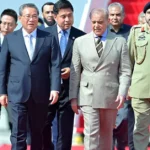Introduction
In a shocking revelation, Omar Ayub, a senior leader of the Pakistan Tehreek-e-Insaf (PTI) party, has claimed that members of the National Assembly (MNAs) from his party are being offered bribes of Rs 3 billion each to switch allegiance. This claim has stirred political tensions in Pakistan and raised questions about the integrity of the electoral process and the motivations behind such offers. As the political landscape continues to evolve, this article explores the implications of these allegations, the reactions from various stakeholders, and the potential consequences for the PTI and the broader political arena in Pakistan.
Context of the Claims
Omar Ayub’s allegations come at a time when Pakistan is grappling with significant political turmoil. The PTI, led by former Prime Minister Imran Khan, has faced numerous challenges since its ousting from power in April 2022. The party has been involved in various controversies, including accusations of corruption, mismanagement, and political maneuvering. The political environment has been characterized by instability and uncertainty, leading to a volatile situation where such claims can have far-reaching consequences.
The alleged offers of Rs 3 billion to PTI MNAs raise concerns about the integrity of the political system in Pakistan. Such financial inducements can undermine the democratic process and erode public trust in elected representatives. Ayub’s claims highlight the lengths to which some factions may go to destabilize political opponents and garner support for their agendas.
Implications for PTI
The implications of Ayub’s claims are significant for the PTI. If proven true, the allegations could further damage the party’s reputation and raise questions about the loyalty and integrity of its members. The PTI has positioned itself as a party advocating for accountability and transparency, but allegations of bribery could tarnish this image.
Moreover, these revelations could lead to internal divisions within the party. MNAs who may be approached with such offers could face moral dilemmas, and their decisions to either accept or reject these inducements could shape the party’s future. The potential fallout from such decisions may lead to a loss of trust among party members and supporters.
Additionally, if a significant number of MNAs were to switch allegiance, it could weaken the PTI’s position in the National Assembly. This shift could allow rival parties to gain more power and influence, further complicating the political landscape in Pakistan. As the party navigates this crisis, it will need to address the concerns of its supporters and take steps to safeguard its integrity.
Political Reactions
The political reactions to Ayub’s claims have been swift and varied. Members of the opposition parties have seized upon the allegations to criticize the PTI and its leadership. They argue that such claims are indicative of a corrupt political culture that has taken root in Pakistan. This situation has opened the door for rival parties to rally support by positioning themselves as champions of clean politics.
Former Prime Minister Shahid Khaqan Abbasi, a senior leader of the Pakistan Muslim League-Nawaz (PML-N), has called for a thorough investigation into the allegations. He emphasized the need for accountability in political dealings and urged the government to take decisive action against anyone involved in such corrupt practices. Abbasi’s comments reflect a broader sentiment among opposition leaders who are eager to exploit the situation to their advantage.
Conversely, PTI leaders have defended the party and its members, dismissing the claims as baseless and politically motivated. They argue that the allegations are a ploy to undermine the PTI and distract from the government’s failures. The party’s supporters have rallied behind Ayub, emphasizing the importance of loyalty and integrity among its members.
The Role of the Election Commission
The Election Commission of Pakistan (ECP) plays a crucial role in ensuring free and fair elections. The allegations of bribery among MNAs raise significant concerns for the ECP, which is tasked with monitoring the conduct of political parties and candidates. The commission has a responsibility to investigate any claims of corruption and take appropriate action to uphold the integrity of the electoral process.
If the ECP finds credible evidence of bribery or inducements, it may initiate investigations into the involved parties and individuals. Such actions could lead to disqualifications, penalties, or even criminal charges against those found guilty. The ECP’s response to these allegations will be closely scrutinized, as its actions will significantly impact public perceptions of the electoral process in Pakistan.
Moreover, the ECP’s handling of this situation could influence the upcoming elections in Pakistan. If the commission is perceived as taking decisive action against corruption, it could help restore some public trust in the political system. Conversely, any perceived inaction could further erode confidence and fuel public disillusionment with politics.
Public Sentiment and Trust in Politics
Public sentiment regarding Ayub’s claims and the broader political landscape in Pakistan is a critical factor to consider. Over the years, citizens have grown increasingly frustrated with corruption and the perceived lack of accountability among politicians. The allegations of bribery among PTI MNAs are likely to resonate with a public already disillusioned by political scandals.
Many citizens are calling for greater transparency and accountability in political dealings. They demand that elected representatives prioritize the needs of their constituents over personal gain. The situation presents an opportunity for political parties to engage with the public and demonstrate their commitment to ethical governance.
Moreover, grassroots movements advocating for political reform may gain traction in the wake of these allegations. Activists and citizens alike may mobilize to demand systemic changes that address corruption and promote integrity in politics. The youth, in particular, may play a pivotal role in shaping the future political landscape as they seek to hold their leaders accountable.
Media Coverage and Its Impact
The media’s coverage of Omar Ayub’s claims and the subsequent political developments will play a significant role in shaping public opinion. News outlets have a responsibility to report on the situation accurately and objectively, providing citizens with the information they need to form their own opinions. Sensationalized reporting, on the other hand, can exacerbate tensions and contribute to misinformation.
As the situation unfolds, the media’s role in investigating and highlighting issues of corruption and accountability will be critical. Investigative journalism can uncover facts and shed light on the motivations behind the allegations. Responsible reporting can also serve as a catalyst for political change by encouraging public engagement and accountability.
Moreover, social media platforms are increasingly influential in shaping public discourse. Citizens can voice their opinions, share information, and mobilize support for causes they believe in. The interplay between traditional media and social media will be instrumental in amplifying public sentiment surrounding the allegations and the political climate.
Potential Legal Consequences
If the allegations of bribery against PTI MNAs gain traction, there could be serious legal ramifications for those involved. The Anti-Corruption Bureau and other law enforcement agencies may be called upon to investigate the claims. Should credible evidence emerge, legal action could be taken against individuals who have accepted bribes or participated in corrupt practices.
The legal consequences could extend beyond individual MNAs to encompass the broader political landscape. Parties that are found to have engaged in corrupt activities may face penalties, including fines or disqualification from participating in elections. The integrity of the political system hinges on the ability of authorities to address corruption effectively.
Additionally, the legal proceedings may serve as a deterrent to others who may contemplate engaging in similar corrupt practices. The message that corruption will not be tolerated could contribute to fostering a culture of accountability within the political sphere.
Omar Ayub’s claims regarding PTI MNAs being offered Rs 3 billion each to switch allegiance have ignited a political firestorm in Pakistan. The implications of these allegations are far-reaching, impacting the PTI, the electoral process, and public trust in politics. As the situation unfolds, it is crucial for the relevant authorities to address these claims transparently and effectively.
The role of the Election Commission, law enforcement agencies, and the media will be pivotal in ensuring that the political landscape remains accountable and free from corruption. Public sentiment and engagement will also play a critical role in shaping the future of politics in Pakistan.
As citizens demand greater transparency and accountability, the events surrounding these allegations may serve as a catalyst for meaningful change within the political system. Whether this incident will lead to a renewed commitment to ethical governance or further entrench corruption remains to be seen. What is clear, however, is that the future of Pakistani politics hangs in the balance as the nation grapples with the implications of these explosive claims.
#OmarAyub #PTIMNAs #PoliticalCorruption #PakistanPolitics #Accountability #ElectionCommission #BriberyClaims







